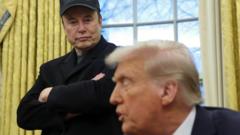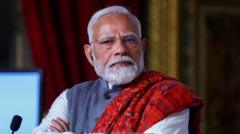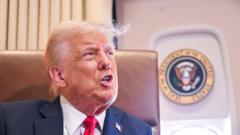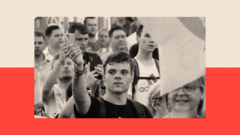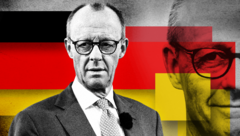As the election date approaches, the German electorate is confronted with pervasive disinformation efforts from Russian sources and polarizing rhetoric associated with influential figures like Elon Musk.
**Dual Threat: Russian Disinformation and Elon Musk's Influence in Germany's Elections**

**Dual Threat: Russian Disinformation and Elon Musk's Influence in Germany's Elections**
Germany prepares for federal elections as foreign disinformation campaigns target voters amid rising political tensions.
In a politically charged atmosphere leading up to Germany's federal election on February 23, 2025, voters find themselves navigating a landscape flooded with disinformation. Recent actions by far-right MP Stephan Protschka highlight a trend of sensationalist claims that exploit existing social anxieties. His social media posts, alleging a secret collaboration between Germany's Green Party and the Ukrainian government to orchestrate terrorist attacks, embody the chaotic disinformation landscape.
Research shows that these false narratives, part of a more extensive campaign largely attributed to Russian operatives, aim to create discord among constituents and sow distrust in mainstream political institutions. The bots and fake accounts amplify the reach of these stories across various platforms, including X, Facebook, Telegram, and notably, the emerging platform Bluesky.
Cleverly designed manipulations, including AI-altered videos, further complicate the media landscape, making it increasingly difficult for voters to discern truth from fiction. Germany's domestic intelligence agency warns that these disinformation efforts are designed to undermine confidence in established political parties and media outlets, thereby legitimizing the far-right Alternative for Germany (AfD) party.
The timing of these campaigns corresponds with a heightened global focus on disinformation as a tactic in influencing electoral outcomes. Observers are concerned that this dual front—spurred by state-sponsored actors and prominent individuals—could significantly impact citizens' perceptions and voting behaviors.
As Germany gears up for its elections, the consequences of this digital warfare loom large, raising critical questions regarding the integrity of its democratic processes and the resilience of its electorate against such sophisticated and insidious tactics. Voters must not only be aware of the candidates and policies at stake but also remain vigilant against the flood of disinformation targeting their beliefs and choices.
Research shows that these false narratives, part of a more extensive campaign largely attributed to Russian operatives, aim to create discord among constituents and sow distrust in mainstream political institutions. The bots and fake accounts amplify the reach of these stories across various platforms, including X, Facebook, Telegram, and notably, the emerging platform Bluesky.
Cleverly designed manipulations, including AI-altered videos, further complicate the media landscape, making it increasingly difficult for voters to discern truth from fiction. Germany's domestic intelligence agency warns that these disinformation efforts are designed to undermine confidence in established political parties and media outlets, thereby legitimizing the far-right Alternative for Germany (AfD) party.
The timing of these campaigns corresponds with a heightened global focus on disinformation as a tactic in influencing electoral outcomes. Observers are concerned that this dual front—spurred by state-sponsored actors and prominent individuals—could significantly impact citizens' perceptions and voting behaviors.
As Germany gears up for its elections, the consequences of this digital warfare loom large, raising critical questions regarding the integrity of its democratic processes and the resilience of its electorate against such sophisticated and insidious tactics. Voters must not only be aware of the candidates and policies at stake but also remain vigilant against the flood of disinformation targeting their beliefs and choices.




